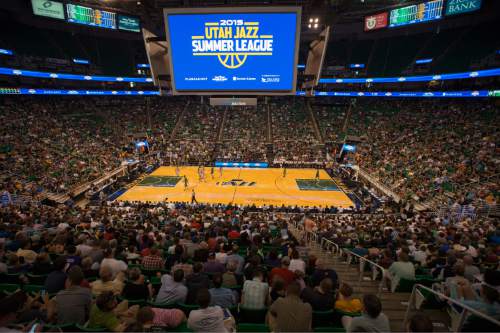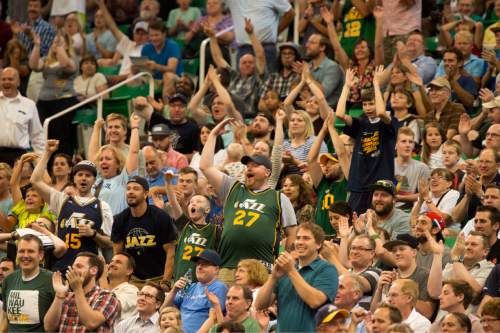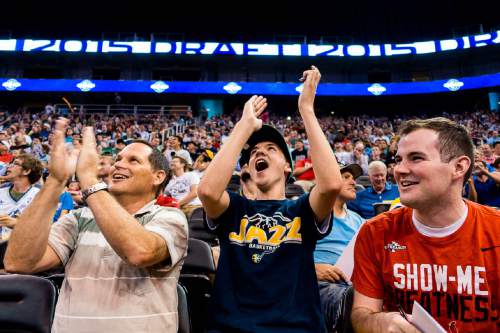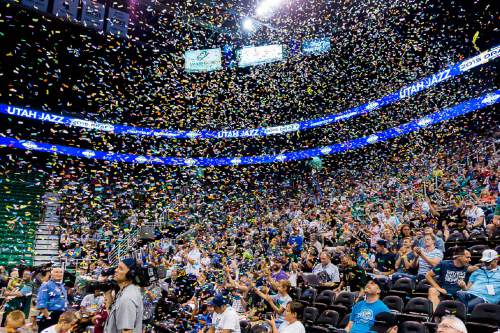This is an archived article that was published on sltrib.com in 2016, and information in the article may be outdated. It is provided only for personal research purposes and may not be reprinted.
The Larry H. Miller Group will receive up to $22.7 million in tax breaks to help cover the cost of its planned renovation of Vivint Smart Home Arena.
Members of Salt Lake City's Redevelopment Agency on Tuesday heard some opposition to the proposal but ultimately voted unanimously in favor of the tax increment reimbursement plan, which will allow the owners of the Utah Jazz to recoup a sizable chunk of their $125-million investment over the next quarter-century.
"The improvements they will be making … will be significant and will really add value to the venue and to the neighborhood," said RDA Vice Chairman Derek Kitchen, one of six board members who voted for the tax break.
Vivint Arena, the home of the Jazz, is set to undergo a "major renovation" over the next two years. After spending about $15 million on new video screens for the arena, Larry H. Miller Group (LHM) plans to pump another $110 million into the 25-year-old building. LHM will be allowed to recoup about 18 percent of the total cost of the project, thanks to the tax breaks.
"This will enable us to move forward and return that arena to world class again," Utah Jazz President Steve Starks said.
Approximately $12 million of the reimbursement would come from a percentage of the increased property taxes LHM would pay on the arena as a result of the improvements to the block. The company would also stand to receive a projected $3.9 million from interest on that money, according to city documents.
"This approach puts the burden on us to create the value," Starks said. "… There's really no risk to the city. If the value isn't created, then there's no reimbursement to us."
LHM, meanwhile, will also get about $6.7 million — approximately $306,000 a year — that would come from tax increment the RDA collects from other parts of the city's Central Business District project area.
Kitchen said he would have liked to see the state or some other entity help cover that $6.7 million, saying that he worried about taking money away from the project area that could otherwise go toward homeless issues, transportation or public art. Board member Stan Penfold, meanwhile, said he felt comfortable allocating that money because of the arena's impact on downtown bars and restaurants as well as other businesses in the area.
The Utah Taxpayers Association said it would not oppose LHM's proposal. Representatives for the Downtown Alliance and the Gateway mall were among those who spoke in support of the Miller's funding plan. Several parties, however, spoke in opposition to the proposal at Tuesday's meeting.
Activist George Chapman said the RDA had not taken enough time to allow for public input on the matter.
"In every city where arena expansions have been approved with public funding, there have been big contentious fights," he said. "What you seem to be doing is trying to shove it through without any good public engagement and that's wrong."
Evelyn Everton, the director of Americans for Prosperity's Utah chapter, also spoke out against the plan.
"We absolutely support their efforts to update their arena but we can't support it on the taxpayers' dime," she said.
Opponents of the plan said they objected to giving tax breaks to a wealthy corporation, arguing that LHM could and should pay for the project on its own. Starks, however, told the RDA that arena officials would have to go back to the drawing board on their planned renovation and "would not be able to continue with the project that we have outlined right now" without the reimbursement.
With their tax breaks approved, arena officials said they will continue with plans to begin some upgrades to the building this summer. A majority of the renovations will be completed next summer ahead of the start of the 2017-18 season. The renovation plans include new solar panels, wifi improvements and upgrades to the plaza, as well as seating and suite upgrades.
"There are some events we do not get because of certain issues with our arena," arena president Jim Olson told the board. "We may have the opportunity to get an NBA all-star game once again with a new arena."
LHM has teamed up with Icon Venue Group, a company that recently has been involved in the restoration of Wrigley Field in Chicago, the construction of the new Golden 1 Center in Sacramento and planning for the new home of the NBA's Milwaukee Bucks. SCI Architects, which headed up the $1 billion renovation of New York's Madison Square Garden, also is part of the Jazz's renovation team.
Twitter: @aaronfalk









